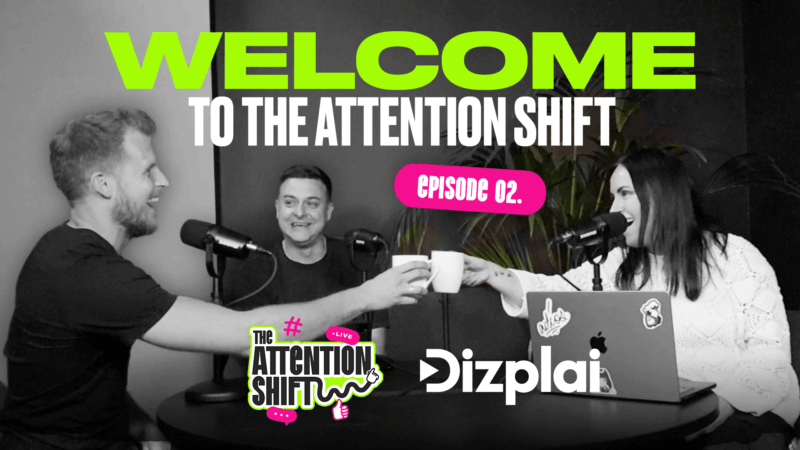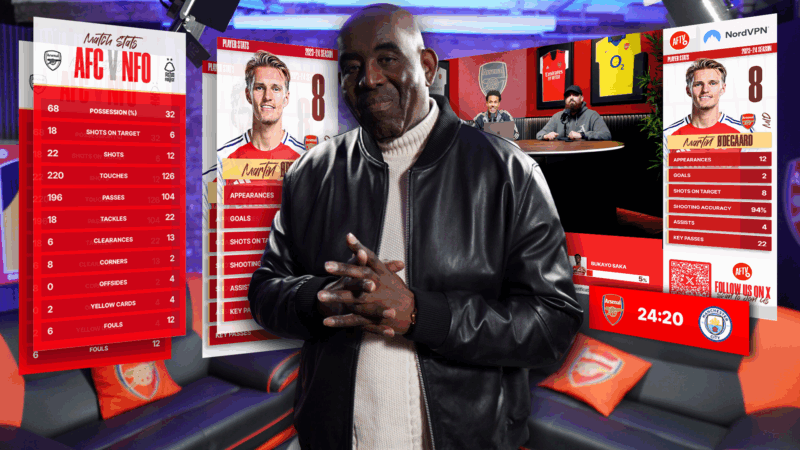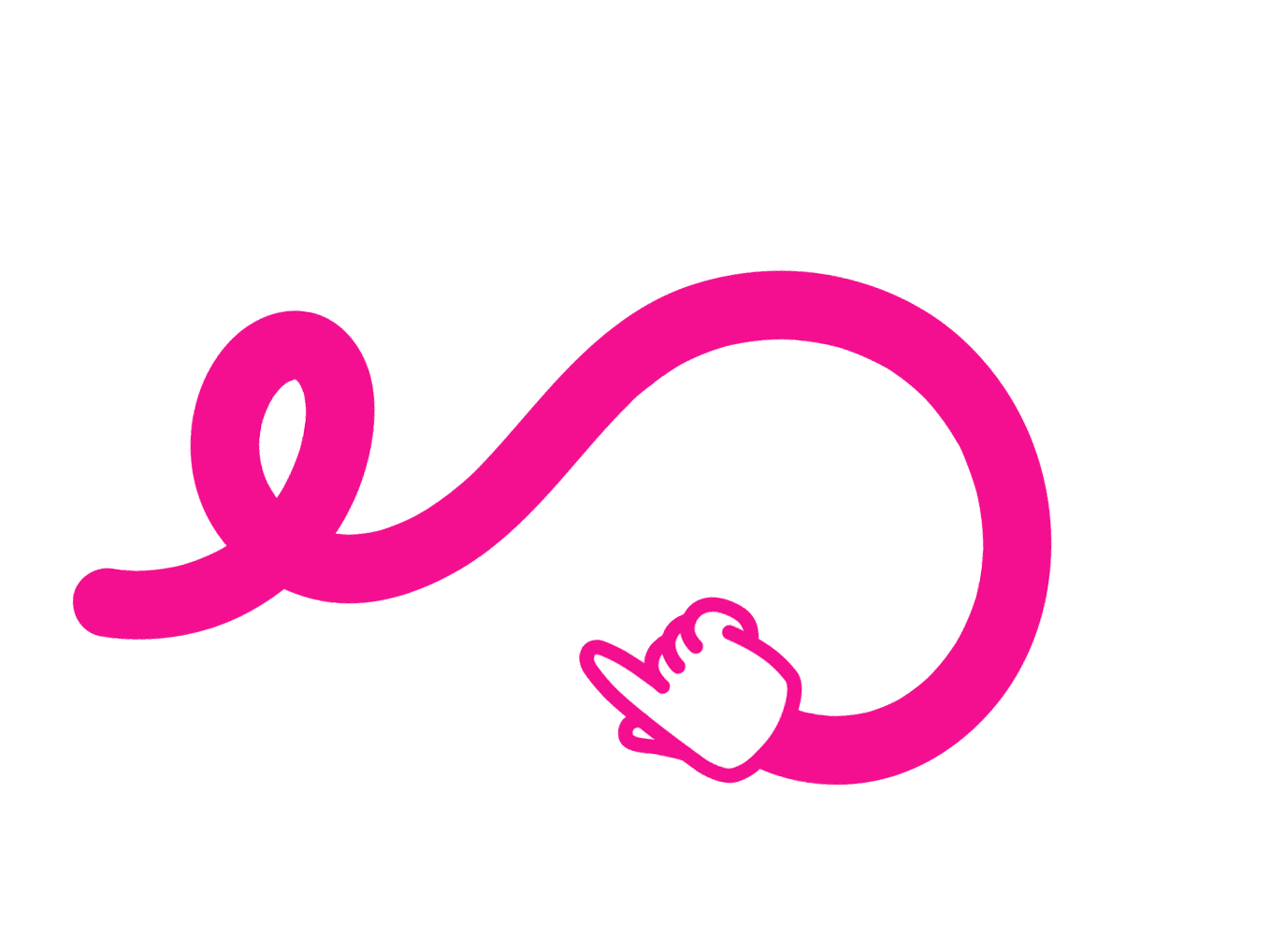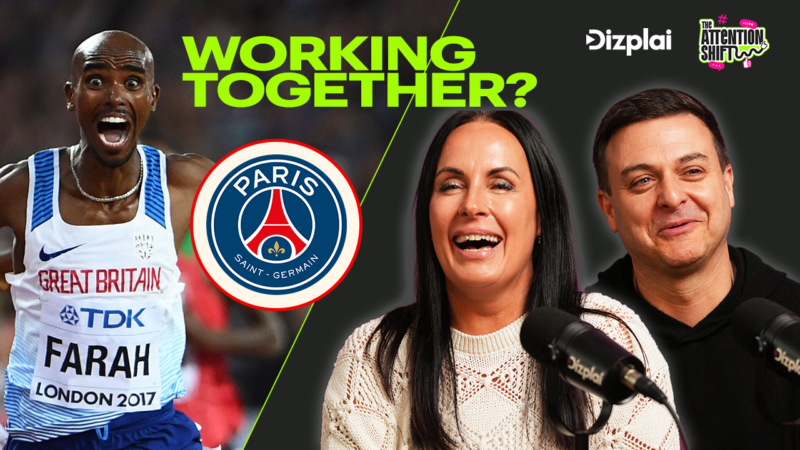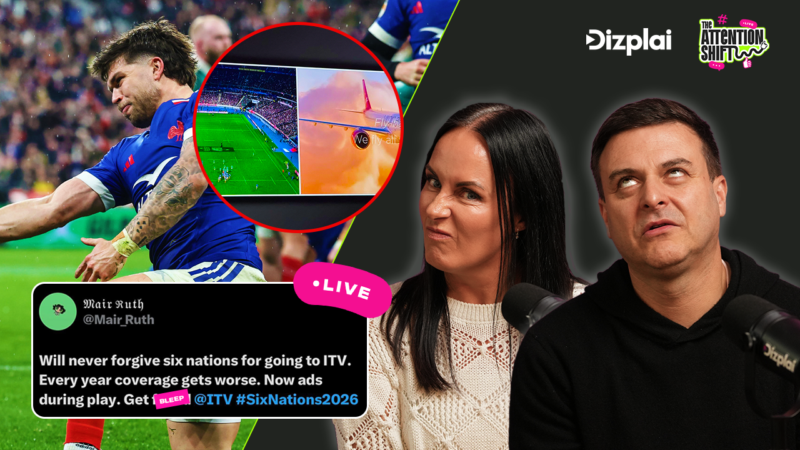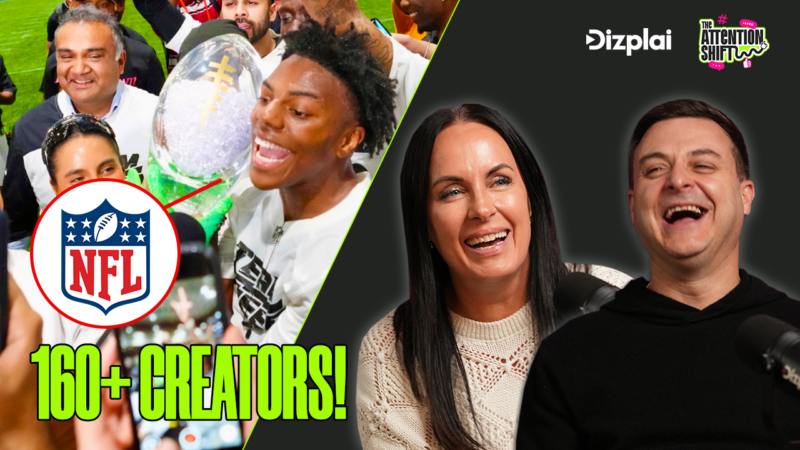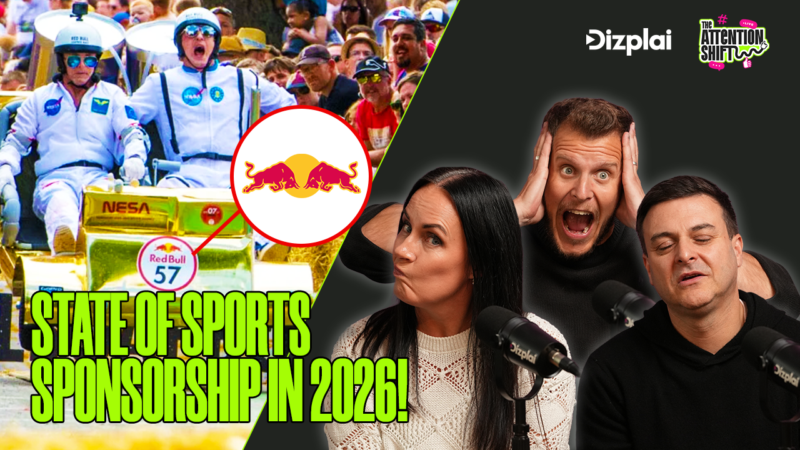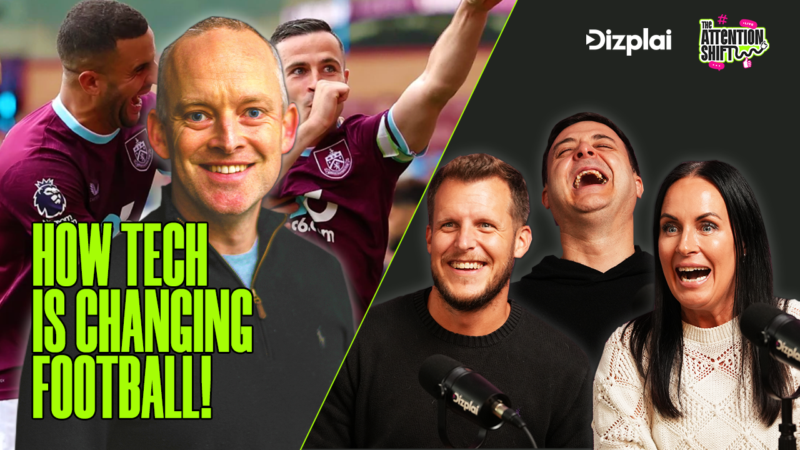
Summary
- PMG’s five forces framework: How the creator economy is fundamentally reshaping sports fandom.
- Baller League’s Gen Z playbook: What traditional sports are missing in the fight for young fans.
- Gen Z’s loyalty crisis: Why individual creators and athletes now trump teams and leagues.
- Creators as the new broadcast networks: How influencers are replacing legacy sports media.
- Athletes turned media brands: The shift from player to platform and what it means for sports.
- Can traditional sports adapt, or does engaging Gen Z require a completely new rule book?
Transcription
Welcome to The Attention Shift, a podcast where sports media gets debated,
memed, duetted, stitched, and reposted faster than I can say, multi-platform media.
Okay, Lee, you chose the topic for this episode of The Attention Shift podcast.
So, thanks, Joe. I was reading PMG‘s 2025 states of sports report.
PMG being rock and roll in your house.
Some kind of report. They’re in a sport, they’re an agency. So, someone probably helped them
to fund it. But it was a very interesting report. The thing that came out from it
was sort of four or five core resources reshaping fandom. They call them culture, community,
content, connection, and customization. And I think they, you know, for us, they’re not
just buzzwords. I think they actually- That all happened to begin with C.
Yeah.
Amazing, really.
Not just buzzwords. And it doesn’t just numb up your tongue.
And there’s not only five of them, so it goes your fingers. But I think that for us,
it’s not just fandom. It’s speaking to more than just what is fandom in the modern age
and how does that work, and how are people consuming things differently.
And I think from the key takeaways I took away, it’s like streaming is the new stadium.
You know, people don’t attend at matches. And if you assume it’s the new stadium,
then, you know, Wembley is YouTube. You know, bad analogy. And I think,
just wanted to kick that off with how people are consuming things differently,
how meeting them where they are, what it means in terms of this new world of culture
content creators and how that all ties together. So just wanted to throw that
out there to you guys in terms of those five C’s, if you get your thoughts.
I mean, I’m being slightly facetious, but, you know, redefining fandom.
I mean, there’s agencies that charge quite a lot.
But we’re going to demystify it for free on the attention.
Although we can take donations.
Anyway, culture, community, content, connection and customization.
I mean, culture. What is culture around sports?
I think we’ve spoken about it before in terms of how it’s changing.
It’s honouring fandom.
You know, fandom, if we’re talking about fandom,
is it’s not just about extracting attention so you can monetise it.
It’s not about extracting cash in terms of subscriptions or auto kits.
It’s the culture, the old kind of culture of fandom,
certainly when I was watching Rotherham United, when I was a teenager.
That’s definitely a niche reference.
Millmoor.
Grey Stadium.
Oh, Grey Stadium.
I mean, unique.
But the culture there, it was about being a teenage girl,
stood in the middle of a load of working class guys
who taught me more than a few swear words.
Also never felt safer, to be honest.
But again, being part of something, that kind of culture,
where it was a place to gather on a Saturday and that’s what it was about.
But what’s the equivalent of that now?
That doesn’t happen so much now.
Particularly not for teenagers.
They don’t very often go week in, week out to a stadium.
So what does that culture mean?
How’s football culture changed for you?
Well, first off, culture’s organic, right?
I don’t think an agency or a team or a federation,
they can set the culture within their own organisation,
but I don’t think they can set the culture for the fans.
I think it’s very, very hard to do it.
They can, I’m going to give a Burnley reference now.
Well, we had Sean Dyche as our manager.
What he managed to do when he came into the club was,
in a lot of ways, remind us as fans what we were about.
We knew what we were about.
Hard-working, salt of the earth.
Burnley‘s that kind of town, right?
And I do remember Millmoor having been a few times
to watch Burnley there back in the day.
We’ve not always been a Premier League team, Joe.
Went for last week, didn’t you?
Yeah, yeah, exactly.
I already had that done on me last week.
Culture is something that I think has to, for me,
come from the fans and start from the fans.
Look, right, the stadiums are not like they used to be
from a football perspective.
You don’t get that same experience that we both had, right,
growing up in our respective teams.
But that football match day, yes, it’s changed now,
but it will still be manifesting itself
in different kind of ways.
So, you know, everyone has their routine on a match day
when it’s a working men’s club or looking Nandos.
It shapes you right, doesn’t it?
And this is the thing, I think,
if we’re talking culture, not just football culture,
it shapes who you are.
And I do wonder if that kind of fandom culture
we’ve maybe been stuck in a rut for the last few years.
It feels like it got quite cookie cutter for a while.
Yeah, I think that’s what came out of this report.
They reported like 46% of Gen Z fans
now are digital firsts and community firsts.
Yeah, yeah.
And that’s why things like Baller League are succeeding
because their way of engaging with a club or a player
is through digital platforms, right?
It’s through YouTube, it’s through TikTok,
it’s through Instagram.
You know, whether it’s them just following a player
who’s doing some stuff off-piste.
Personality, what they wear, the music they like.
And even the other thing that came out as well,
46% of millennials follow sport content creators
as much as they follow sports professionals.
Yeah.
So I think that’s when we talk about culture,
it’s about how are people engaging.
It’s like, where’s your home?
Where’s your fandom?
Yeah, yeah.
Where’s my people?
You know, my people, hopefully down the pub on a Saturday
watching the beers.
But even that’s gone.
I rarely get the chance to do that.
But if you’re Gen Z or even me as an older millennial,
like where are they engaging?
And it’s online.
And I think that’s the thing that comes out of it,
which is if you’re not on these platforms like YouTube
and you’re not engaging people where they are,
then all your fans are going to age out.
So how does a league or a rights owner then deal with that?
If we’re saying that culture, whatever it is,
F1 culture or anime culture is no longer,
you can’t use it as a broad brushstroke.
It doesn’t fit everyone
because we are in this era of hyper-personalization.
How do you create a culture if you’re a sport
or you’re a league or a federation
when you know that everybody’s personal experience
of culture is different?
I think the thing is, I think people,
I think you said the thing,
no one owns your culture, right?
But I think historically,
because of the way that you could engage with a club
was either writing into them,
joining the fan club,
going out to match day or watching on TV, right?
That was your only way that you could be part of that.
And then you get your fandoms
and you go and you get your way fans,
your home fans, your friends in the pub
or watching at home with your family.
That was your kind of culture or experience
of watching a game.
Now is beyond that.
I think people don’t follow teams.
They follow players, generally,
especially younger audiences.
Like if Ronaldo moves or Messi moves to name one.
I was on a panel with Marco from Juve last year
and he talked about the reason they decided
to create the Juve Creator Lab was they had,
I think it was roughly speaking,
450 million followers on social, right?
When Ronaldo left, well, that was 120 million.
And then a few other players left.
And all of a sudden it was like half
that number of followers and they were like,
okay, this is not stable for us
because we’re literally losing
half of our potential audience
every time a player moves on.
So they wanted to try and create something
a bit more organic that was creator led
to have some kind of stability
over that number of, let’s say, fans, right?
They’re not necessarily fans,
they’re more…
Ambassadors is what you’re calling it.
Followers, subscribers.
Do you think some sports rights holders
or leagues felt like they used to own the culture?
I think they felt like they could dictate it.
I think they had like a guiding principle
that they thought they owned.
It didn’t feel like it came out.
I think they thought they owned it.
I think they literally thought that…
I don’t think they ever used to even use
that word culture necessarily.
I worked in football, I worked at Burnley
like 20 years ago, shorter age now.
And I remember culture wouldn’t have been a word
that we would have just talked about the fans.
And I think there was,
I certainly didn’t try ever to have an assumption
that we told the fans what to do.
What I tried to do when I worked there,
and I’ve talked about this recently as well,
was I tried to have fan forums
as often as I could.
Look, I came from a position of strength
because I’d been a fan.
They didn’t work there.
And I worked there.
When I worked there, I was then frustrated
about how we were making decisions
on things that impacted fans.
And luckily enough, I managed to get
into a position where I was running
marketing and media that I put together
a group of fans who I knew and I trusted
that I could regularly lean into
and go, what do you think of this?
What do you think of this?
Look, I knew that certain things
were just going to piss people off.
Right?
That was the obvious things.
But I was able to work with these people
to get a sense of, okay,
what do we need to do here?
Not everyone in the club wanted
to go down that route of doing it.
And that’s the reality, right?
And I’m not saying they’re wrong
for saying that they had a view that
they were in positions paid to do this job
and they should be able to make decisions accordingly.
I had a view that this just de-risks
if we go down that route.
And actually, if we work with fans to do things,
we might have a bit more credibility
when we do the thing that we’re going to do.
Yeah, I think that’s it.
I think ultimately, to answer your question,
you as a individual want
a hyper-personalised experience.
I want to watch it the way
that I want to watch it.
Whenever I want to watch it
with a chat stream on the side
or if I want to watch it with Mark Goldbridge‘s
commentary over the top.
Yeah, TV on me sound like that.
And I might have my own data
and I might want to go back
and watch it this way.
You want to watch it,
or maybe you’re a bit older
and you just want to lean back
and watch it in traditional broadcasts
because there’s still nothing wrong
with the way that it’s filmed.
What you want to do is be part of that community.
You want to find your like-minded people
who like to, you know,
so you all still fall part of that club.
Regardless of how you watch it,
you still want to be part of that belonging.
I do think you do a compatible.
That’s another scene.
Yeah.
You can have at the same time
a personal kind of culture,
your relationship as a fan
and have community,
which implies that you’re all experienced in the sector.
I think these, I mean, look,
the one guiding factor is ultimately your love,
your religion, your church.
I was just going to say that as well, your church.
I think, I think there’s,
you could have put that at church with me, couldn’t you?
They were probably afraid to put church in that.
Ultimately, like we’re all working towards the peak,
which is our, hopefully,
our all general love for the same thing.
But then everyone has their own personalized experience
of how they support their.
Yeah.
Or how you view and like, you know,
because if you’re deep into the insights
and you want to, you know,
you love diving into the data and you have like,
oh, the last time this happened,
you know, you’re into the, you know,
the nitty gritty of XG’s of five seasons ago.
That’s a podcast itself, I think.
But that’s the way you want to consume it.
That’s the way you consume it.
You want to talk to someone about it, right?
You also want to talk to someone
who also isn’t nitty gritty.
And the fact that you can then, you know,
and we’re going on these platforms,
these different platforms and engaging
and finding your people,
that’s going to enable you to do that.
See, and then, but there’s also,
you’ll want to be part of that belonging
is watching that you all want to celebrate together.
You know, like, you know, that’s exhausting.
You know, in England play, you know,
you can hear the cheers, you know,
around all the pubs or around all the houses, right?
And there’s nothing more satisfying.
Doesn’t happen very often these days, right?
But England winning a game and scoring a goal
and that sense of that national pride
and we’re all in it together.
That’s the belonging you want to get.
I feel you have, you have,
the only way you can get that
is by leaning into these content creators,
leaning into these niche communities
and being able to provide them with the experience,
the way that they want to experience it.
So whether that’s on YouTube,
whether that’s on maybe on Roblox, you know,
who knows, whichever way you want to,
or traditional broadcast,
but you want to consume it in a certain way
that you want to view the game.
I want stats, I don’t want stats.
I want to see this, I don’t want to see that.
But all being part of that shared,
you know, like watching it down the pub.
That’s the bit that ties it all together.
And I think that’s, that’s the end.
I think that’s what ultimately
is what’s highlighted from the support is
with people consuming in, as we all know,
in different fragmented ways
and younger fans consuming in much more
in a digital first experience
and then much more open to, you know,
having more direct, you know,
co-creating almost as a match is going on
because they’ll be commenting,
they’re doing their own things.
That’s the thing that creates that belonging
without trying to over monetize it
because I feel like you lose the reason
we’ve lost some of that culture
is because we all feel so burned by,
you know, oh, you’re trying to prove me this,
you’re trying to do that.
And I was going to,
I was thinking about a footballing idea
and then ultimately with obviously,
we’re not just thinking about football, right?
Because there’s different, you know,
there’s whatever sport it is,
whether it’s, you know, archery,
whether it’s canoeing, you know.
I mean, I was chatting with a guy
who works for Crunchyroll,
which is the anime Espoir streamer.
And he was talking about how,
I mean, anime is having a huge moment
at the moment, something like 50% of teenagers
in the US are watching anime weekly.
It’s 40 odd in the UK,
but it’s having this real moment.
And that comes from,
there’s a real respect for anime fans.
He used the word honor,
which I thought was really interesting.
So as Crunchyroll or as the creators of anime IP,
there’s a real honor with which they treat the fans.
And that kind of respect is reciprocated.
And I do wonder if maybe in sports media
in the last few years,
that has broken down to the point
where it’s felt like a very extractive relationship.
But is that, like if you compare football to rugby, right?
Like you’ll get a very different culture
in terms of that respect towards officials,
towards players, towards the games themselves.
And obviously, I watch a bit of rugby,
but I’m a football fan.
And it’s amazing the difference
when you go to both experiences
and look, like football’s visceral
and in the moment and intent.
But rugby fans will probably say
just in a different kind of way.
So it’s the same thing, isn’t it?
They say football is a gentleman’s game played by thugs
and rugby is a thug’s game played by gentlemen.
But I think the challenge then is,
where is the next generation of rugby fans coming through?
Right, whilst it’s got a great match day culture,
it’s broadcasting is not so great.
Actually in France,
they’re doing a pretty good job with rugby at the moment.
But if you look at rugby in the UK,
it’s all over the place.
They’re looking at doing a new franchise model
to try and save it
because they can’t get these younger fans.
They’re not meeting them where they are.
They’ve got this great history.
You’ve got your great legacy.
How are you going to engage them?
How are you going to meet them where they are
and how are you going to get them to buy into this?
I’m sticking on the anime theme
because it’s interested me,
since I’ve worked in sport,
how little sports media goes fishing
in these other fandoms for that kind of new organization.
So again, if we’re thinking
rugby is struggling to bring in new fans
amongst young people,
why not go and collaborate with an anime IP?
We saw in the US Olympic sprinting trials,
Noah Lyles pulling out Yu-Gi-Oh! cards
from behind his running number.
Dominic Solanke is a mad anime fan
to the point where he does anime inspired celebrations,
you know, Naruto.
So why is sport,
or I mean, I’m saying this as a generalization
of someone who’s relatively new,
but it seems loath to go fishing
in those other kind of areas of fandoms.
And why do you think that is?
Is it about keeping it pure?
No, because I think if there’s a commercial opportunity,
if people see a commercial opportunity
for the go and do it,
I just wonder as well,
is it just the vastness of feeling like
there’s so much going on
and what they’re doing day to day
that to go try fishing somewhere else as well
they just open up a whole can of worms.
And I think sometimes it’s also a leadership thing.
Do the leadership have the knowledge
to challenge the people within their organizations
to go and do something like that?
I don’t think it’s necessarily a sport thing.
I think it might be a football thing
because I’m seeing it with some sporting federations
that they’re very open to collaborating
with other sports to be able to ultimately
you know, take audiences both ways
where they don’t feel like there’s this competition there
and they do feel like this crossover
and actually trying to do those collabs
where that play will play against
that play from different sports.
There’s some similarity between sports
and there is some crossover.
We’ve seen it, right?
It’s happened.
Again, it’s something that creators do.
You get Vox and MMA do it sometimes.
You get the All Blacks do it.
And creators do it loud.
I mean, that’s been the case, isn’t it?
You get it in Aussie Rules football
or you usually get in Aussie Rules football
and some of the Irish sports.
The All Blacks do it with Hello Kitty.
They did a collab with Hello Kitty
because you know, rugby, it’s one thing with rugby
is that if people think of rugby around the world
they think of the All Blacks, right?
That’s saying actually,
allegedly the All Blacks has a bigger following
than rugby has a following
and then rugby is massing its bounds.
They do a lot of these collabs
and they show up in minutes.
I think the trouble is every time something,
there’s kind of two main issues, right?
One is you feel you’re being exploited, right?
If you’re just an honest fan
and you’re like, you know, and you want to try and do it.
So they’re trying to do it for the right reasons
but you just kind of feel like
you’re trying to monetize me again.
Or like, you know, like every time
there’s an NBA shirt coming out
or there’s a new, even in football,
like there’s a new home kit that comes out
or a new away kit.
You know, there’s another 100 quid that you’ll spend
and it’s not done in the right way.
You know, if I was, say I had the home shirt
and I know, let’s say it’s England,
Harry Kane scores in the 70th minute
and they did a promotion, say,
well, we know you’ve got the home kit.
Why don’t you buy the away kit for 50% off?
That would be like a well-timed
monetization opportunity that would do it.
But it’s not like that.
It’s everyone feels cost-living, feels fleeced at the moment.
I also think the other thing you’re trying to battle is
not just the clubs and the leagues
and the federations,
it’s actually some of the older fans.
I think there’s a resistance to,
there’s still this kind of like,
well, football’s always going to be football
or rugby’s always going to be rugby.
Yeah, there is an element of like,
you know, being clueless about it, isn’t it?
I see that.
I see that with my team, Burnley.
We have this discussion on a regular basis
between some of the fans I know
at a similar age to me,
where Burnley have become renowned
the last few years about their player-revealed memes, right?
And there’s friends of mine who will message me
when they see the new meme,
because I’ve done another one, don’t I?
And I’m like, it’s not meant for us.
No, it’s not meant for us, man.
Like, some are fine goods,
some are fine not so you’re like,
but they’re not trying to target me.
They’re trying to reach a new fan base.
And the reality is they’ve become renowned for it
and they have reached it.
How that then converts into becoming a fan,
who knows, right?
And hopefully they’ve got data on that
and they’re working that out.
Because I’d love to see my team to be bigger than we are
or to be able to generate more revenue
to be able to challenge the big boys.
Because like you say, the reality is
we’re about to go into a premium season.
Fingers crossed.
Good luck.
Yeah.
But if it was done properly, right?
If you owned the platform, you’re doing it properly,
you’d make sure your mates didn’t see that.
That they didn’t see that
or they just got the traditional way of it being.
If it really annoys,
so I mean, that’s our hyper personalized experience
means you see the things that you want,
but you’re still part of the announcement
that you’re not getting outcasted from the announcement.
And I think it’s a really interesting point
because you’ve got things like tunnel fits,
which is like YouTube or TikTok type content.
But actually that can sit quite happily on there.
And the purists who only watch on subscription services
or linear broadcast will never see that anyway.
So it doesn’t really matter.
That brings us to content,
which is another one of the C
in those five forces you talked about.
In terms of what, I mean,
this is a whole new competency that sports media has to learn,
isn’t it?
Different types of content for different types of time.
Different cultures back to that.
See you again in different types of platform.
Like it’s one-on-one marketing strategy, right?
It’s kind of like, you know,
we’re like, you know,
we’re right next to the right audience.
Right, it’s right time.
Yeah, but not everyone always thinks like that.
And again, it’s,
and I feel like I’m being the apologist here,
it’s overwhelming.
And there’s lots going on.
I love sort of kit culture content and,
you know, I love buying football kits of random teams.
I’ll never go and watch and,
but just because the kit looks cool
and I’ve got my eye on a few at the moment.
And then this is the whole,
there’s a whole,
you know, sort of contemplate
that comes on the back of that too.
There’s lots of different ways
that you can connect to fandom
that’s not necessarily about the game, right?
It’s like Drive to Survive, right?
Drive to Survive is always the headline thing.
And it’s done a great job, right?
Even one of my close friends is a woman
who now wants to go watch the F1 race.
She never would have actually committed to the gap
because you’re telling the stories,
you’re buying in to the relationship
with the people, the sports.
You’re peeling back the curtain.
You actually find out who the people are
because when you see them in the pinnacle
of their sport, the live event,
you just see what’s the other people.
The polished version, yeah.
Yeah, and then like similarly,
like if you’ve not seen it,
the NASCAR, they’re just on season two
of the NASCAR series too,
that’s on Netflix as well.
In a lot of ways, I prefer that to Drive to Survive.
And look, NASCAR really centered
on a very specific part of the U.S.
But then you go and see these drivers
and hear these drivers talking,
it’s like they’re like you or I,
just they’re really good at driving a stock car, right?
But they’re living in these amazing houses on lakes,
but they’re pretty normal people.
And actually when you see that,
you go, actually some of them are a little bit boring,
but actually that’s quite comforting
they’re a little bit boring.
They’re just pencil drivers,
they’re just very boring people, you know.
In the case though that now Drive to Survive is-
It’s too polished, yeah.
It’s too polished.
It almost feels like, you know,
and also is there a case where people go,
okay, storytelling,
okay, we’ve done storytelling,
we’ve done Drive to Survive
or we’ve done the NASCAR docs,
where actually it’s much more sophisticated than that.
It’s co-telling the story, isn’t it?
It’s like, you know, that’s what I read in the article,
which is like ultimately what you want to say,
you’re co-creators, right?
That’s why the rise of content creators is like,
you’re telling one side of the story,
which is your view of the story
and your hope maybe a polished view,
even if it is Drive to Survive,
it’s still a polished view of your stories
that you want to tell the season
and how you want to present it.
Then you’ve got the fans who are watching it
who are then becoming the content creators
who are selling their authentic view
or that they want to see.
And everyone has a view.
And that’s why I think it’s like the more almost,
the reason these things are so successful ultimately
is because they’re stripped back,
they’re real, they’re not.
They range onto the fourth one,
it gives you a connection.
Like you get a connection to the spotlight.
Similarly, I think it was on Netflix as well,
the PGA have done that.
And actually that was filmed
when everything was going on.
Yeah, with the live call.
And you see Rory getting really salty behind the scenes
and he’s definitely like,
he’s definitely not happy with everything that’s going on.
And he was fascinated seeing all that happening,
which I think, look,
I think if they knew that was going to happen,
there’s no way on this earth they would have done anything.
And it was so compelling because that was going on.
You actually see the dynamics.
And again, I think people connect to that.
Because they think, look,
they might be gazillionaires these people
and they’re flying around a private jet.
But actually when it gets into the moments
where it’s not polished and it’s not media produced,
they’re just normal people working out
how the hell do I navigate this?
Yeah, and do you know that when I read a lot of research
and insight around young people and their fandom,
they want content that feels like it’s made for me.
And it’s either because it reflects my life back at me.
You moved onto customization now, well, that’s the fifth one.
Well, I’ll work it in somehow.
But again, you look at someone like Ilona Mayer
and you look at her TikTok
and she’s doing get ready with me videos,
putting makeup on right next to a video with her
in her kit and training and doing sprints or shuttle runs.
And then the next one she’s in a bikini
doing body positive stuff.
I mean, that’s the kind of stuff that is like,
that feels like it’s made for me.
You’re not defining me, I’m defining who I am.
And if I want to do something else,
I’m going to do something else.
People appreciate that honesty and put themselves out there.
She’s connecting more than any initiative
that’s run by a rugby federation or a team.
She’s connecting more on that level.
That’s the worry, isn’t it?
With all these sort of Drive to Survive,
golf ones.
It’s like, how many people are watching series two?
How many people?
Well, it’s dropping off.
And that’s the thing.
A lot of this shoulder content,
it runs out of steam by series six, series seven.
But it’s not the same as any box set that you watch
that I could hope I’ve lost after series one.
Or when I realized what was going on,
I’m not watching another series.
I can’t speak with this.
And again, it comes back to commercials, doesn’t it?
Series one goes off like a rocket and everyone goes,
great, we’ve got it onto a winner,
let’s commission it.
But that’s when the athletes can step in, though.
That’s when it does curtain off, to your point.
That one-on-one, the athlete filling on their phone
is just, I’m just going to this event,
or they strip over, or they’re just having a laugh
with their mates.
That’s the thing that continues that connection
that’s going to drive the interest back when it does,
when people do want to see the next series.
As people, we want to have that connection.
We want to feel that we’re part of it.
With social media, you do have that relation,
that almost one-to-one relationship,
where you can comment, and if you’re lucky enough,
they might comment back.
This came up when I was lucky enough
to be in Lausanne at Think Sport.
Does sport need more entertainment, then,
in your view?
Sports should be entertainment.
I mean, if you think about the US, right,
every sport, I mean, they’re entertainment.
First, yeah, that was the subject of the conversation.
And media organisations just happen to do sports.
That was it, yeah.
So this Netflix-ification sport.
I watch sports when I’m in the US,
and it just doesn’t feel the same,
because we’ve not been brought up that way, right,
to consume stream sports in that way.
It’s almost like the sport gets in the way
of everything else, and like, actually,
I want to really have that intensity.
I think the closest thing to our sports here
in the UK and Europe is probably college sports,
because it actually does mean something different
to, let’s call it, franchise sports out there.
But yes, I think we need to be a little bit more
entertaining in this country,
in terms of how we, I think, how we treat fans
in physical experiences, certainly.
It feels like it’s going to be forced upon sport over here.
I think the Hundred do a pretty good job.
I think the answer is, so you said,
you think of like sports,
you think of like Super Bowl, right,
it’s the ultimate sports entertainment thing.
But I think in the UK, like you said,
they’ve tried it a lot of times,
and it doesn’t, it’s never done.
I think the one, the one sort of franchise,
if you like, that’s doing really well,
is the Hundred.
I think you get a right mix of like family,
entertainment, quick sport,
because it’s entertaining,
so it keeps people interested,
because it is fast paced,
it is constantly changing.
But there’s that whole sort of family thing.
I think if you tried doing that,
like, you know, half-timer FA Cup final,
is it going to resonate the same?
Coldplay in the half-time.
And the funny thing about the Hundred as well is,
I mean, look, I, you know,
I love cricket, and I was as cynical
as probably the next cricket fan,
when they said they’re going to do a Hundred,
and I remember, and I watch a lot of cricket,
I watch cricket whenever I can,
to be brutally honest, like most sports.
And my wife came in the room,
and she was like, oh, what’s that?
I went at cricket, she went, no, no,
that’s different.
I was like, what do you mean it’s different?
She went, it looks different.
It’s just a big meal on my,
I mean, it’s not that different.
Very colours.
No, no, it looks different.
And she was like, can we go?
And I remember we went,
my wife, my daughter and I, we went,
and we did, did a full day,
it’s not Langstreet,
Langstreet can’t kick it around.
And we went to the women’s game,
we went to the men’s game,
we strolled ahead all day,
and we took padlocks with us,
and we spent, like, I was amazed
that I managed to get both of them
to stay there for five or six hours.
But like I said, there was entertainment,
thankfully the weather was pretty much okay,
DJ on, stuff going on,
the women’s game is different to the men’s game,
and I was able to explain to them
how it was different,
and they had an amazing experience,
and it’s my fault we’ve not been back since,
because I’ve just not organised myself,
but they want to go against the game,
and I thought, I’ll never get
to do anything like that.
And so, so well done to The Hundred,
because you did something
I didn’t think you could do.
Yeah.
Yeah, and because it’s been designed.
Yeah, and that’s the trouble, isn’t it?
And that was the same thing with Baller League.
Yeah.
You know, I tuned in,
I only missed two of the 12
Monday nights of Baller League,
but it was designed to keep my interest,
and therefore sustain my attention.
You know, I’d tune in at kind of
half five, six o’clock,
I’d have it on my phone,
I might be cooking tea,
and but then I’d sit down
and watch it afterwards.
But the fact that it was,
you know, short form,
half an hour matches, 15 halves,
that I absolutely love the game changer
at the end of each half.
And actually, as the weeks went by
and people got used to it.
You got the rivalry.
Yeah, well, you got the rivalry,
as you got the beefs,
you know, they got the bit of drama.
But then what was interesting again,
looking at the comments on YouTube,
you start getting people predicting
what the game changer is going to be,
or I really want this,
I’ve not seen this one.
And it was that anticipation,
but then that sustained attention.
Yeah.
Over what was quite a long
period of content every Monday night.
Starting about six
and it’s going on till half ten.
You saw a bit of a drop off after nine.
I think that’s probably…
Bedtime.
But designed for entertainment.
But when sport is designed for entertainment,
that’s like red rad to a ball to some people.
OK, so to wrap up then,
if it’s funnily enough,
I’ve been talking for half an hour.
Do we think that PMG‘s Five Forces
encapsulate fandom,
or do you think there’s more to add to that?
Or, you know what, like…
I think it does.
I think it’s very marketing,
and it’s very…
I’m sure if we thought hard enough…
I’m sure we can come up with a party.
And it’s next week’s episode.
The Attention Shift‘s.
Seven.
Oh, we should do that.
Yeah, yeah, yeah.
That’s the point of view.
One up then.
Graves, make a note.
But no, I think it does.
And I think, you know,
I did write an article about this.
And I think the whole point about
is the reshaping focus of fandom
and what fandom means in the modern age
and how do you have to adapt to that
is a good way to encapsulate
those kind of five pillars.
Anything that gets people talking
about how fandom is changing
and how we better serve fans.
I mean, that’s what it comes down to,
doesn’t it?
Really, we should be
in the service of the fans
with whatever we do,
whether we’re in charge of ticketing
for the live games
or whether we’re in media like we are.
It should be in service of the fans.
Anything that sparks a conversation
about how that’s changing
and what fandom is in 2025.
It’s not that thing.
Cool. Thanks, Joe.
Thanks, Amy.
Thanks, Ed.
That’s it for this episode
of The Attention Shift.
Remember to like and subscribe
and listen in next time
and do let us know
what you think of the roundlings.
You can email us.
hello@attentionshift.media.
That’s hello@attentionshift.media.
Until next time, thank you.
Thanks.
Adios.
So that’s it for this episode
of The Attention Shift.
Remember to like and subscribe
and listen in next time
and do let us know what you think
on hello@attentionshift.media.
That’s hello@attentionshift.media.



